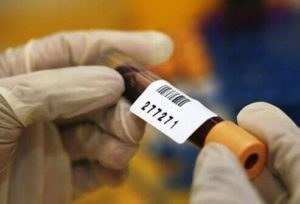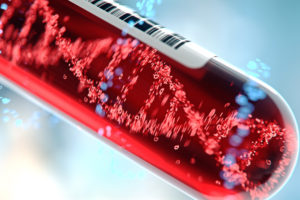Mantle Cell Lymphoma (MCL) Samples
Bay Biosciences provides high-quality fresh frozen biopsy tissue samples, with matched fresh frozen sera (serum), plasma, and bone marrow aspirates, bio-fluids, from patients diagnosed with mantle cell lymphoma (MCL).
The sera (serum), plasma and peripheral blood mononuclear cells (PBMC) biofluid specimens are processed from from mantle cell lymphoma (MCL) patients peripheral whole-blood using customized collection and processing protocols.
Fresh frozen tissue and matched biofluid samples were, collected from unique patients diagnosed with mantle cell lymphoma (MCL).
Bio-samples are provided to a valued pharmaceutical customer for research, diagnostics, discovery, and drug development.

Mantle Cell Lymphoma (MCL) Overview
Mantle cell lymphoma (MCL) is a rare form of cancer that affects the lymphatic system. It is one of the most aggressive types of lymphoma, with relatively short responses to therapy. Patients with MCL also experience frequent relapses, even with early and intensive treatment.
Lymphomas are cancers that stem from a type of white blood cells called lymphocytes. MCL occurs due to malignant changes in lymphocytes in the lymph node’s mantle zone, which is the outer edge of a lymph node’s follicle.
The two main types of lymphoma are Hodgkin lymphoma and non-Hodgkin’s lymphoma. MCL is a type of non-Hodgkin lymphoma.
MCL is a type of aggressive cancer that doctors may find challenging to treat.
As new treatments emerge, survival rates improve. Currently, individuals with an MCL diagnosis have an average overall survival time of 5–7 years. Most patients have a progression-free period of 20 months.
The survival rate for this cancer has almost doubled over recent decades. In the future, research is likely to further progress, offering more people with MCL an improved outlook.
Signs and Symptoms of Mantle Cell Lymphoma (MCL)
MCL forms in the lymph nodes, which is why it can quickly spread to other lymph nodes throughout the body. It can also spread to the spleen, bone marrow, blood, liver, and gastrointestinal tract.
Patients with MCL may experience the following symptoms:
- Abdominal Pain
- Bloating
- Fatigue
- Fever
- Indigestion
- Loss of appetite
- Night sweats
- Nausea
- Pain in the lower back
- indigestion
- Unexplained Weight Loss
- Vomiting
Causes of Mantle Cell Lymphoma (MCL)
Experts do not know the exact cause of MCL. However, approximately 85% of people with the condition have a genetic change, or mutation, in chromosomes 11 and 14. Short segments of these chromosomes may exchange places.
The median age at diagnosis for people with MCL is 68 years. MCL is also two to three times more common in men than it is in women.
In the United States, non-Hispanic white people have the highest incidence of MCL.
Diagnosis of Mantle Cell Lymphoma (MCL)
To diagnose lymphoma, a doctor will take a detailed patient history, perform a thorough clinical evaluation, and use various specialized tests.
One of these tests is a biopsy of the affected tissue, usually a lymph node, where a doctor takes a sample of the tissue to analyze in a laboratory.
Once the doctor establishes that a person has lymphoma, they will perform a more in-depth examination to determine whether it is MCL. Identifying the correct subtype of lymphoma is essential to ensure a person receives the most suitable treatment.
A doctor diagnoses MCL if they can determine that the lymphoma cells:
- have surface markers of B cells, which are a type of lymphocyte
- create excess amounts of a protein called cyclin D1, which stimulates growth
- have changes in chromosomes 11 and 14
The doctor then performs staging tests to find MCL’s location and how far it has spread.
Determining the stage of the condition is important for developing a prognosis and creating a treatment plan suited to an individual.
The following are tests doctors use to determine the stage of MCL:
- Complete Blood Count: This test helps examine the concentration of red blood cells, white blood cells, and platelets.
- Bone marrow biopsy: This procedure helps determine whether MCL has extended beyond the lymph nodes and into the bone marrow.
- CT and PET scans: Doctors use these to check whether the condition is affecting the deep lymph nodes, liver, spleen, or other parts of the body.
- Measurements of lactate dehydrogenase (LDH) and beta-2-microglobulin: These indirect markers of MCL show the extent and rate of progression.
Treatment of Mantle Cell Lymphoma (MCL)
Doctors may use the Mantle Cell Lymphoma International Prognostic Index (MIPI) to plan treatment once they know the stage of the condition. The MIPI score depends on a person’s:
- Age
- Ability to perform daily activities
- LDH levels
- Leukocyte, or white blood cell, count
How well a person can perform daily activities is indicative of how well they could tolerate chemotherapy. The LDH level and leukocyte count indirectly measure disease activity.
The number of factors present at the time of diagnosis determines to which of the three categories, low, intermediate, or high risk, a doctor assigns a person. They then use the assigned category to select the best treatment option.
Chemotherapy is the primary treatment for MCL. Sometimes, doctors combine it with targeted therapy. When possible, chemotherapy is intense, and if a person responds to it well, a stem cell transplant is one of the options.
If an individual has stage 1 or 2 MCL at diagnosis, doctors often treat it with chemotherapy and immunotherapy, which uses medications to destroy cancer cells. They may also use radiation therapy at the disease site after the patient has undergone chemotherapy, to reduce the cancerous cells further and increase the chances of successful treatment.
If the cancer is in stage 3 or stage 4 upon diagnosis, a doctor will consider a person’s characteristics, preferences, and clinical and disease factors when choosing a treatment plan.
People who are fit and younger than 65 years old may receive an intensive chemotherapy course with therapy to send the cancer into remission. Autologous stem cell transplant and immunotherapy maintenance can then follow.
Single drug treatments are an option for older adults and those whose bodies are not healthy enough to handle the side effects of combination chemotherapy.
Managing Mantle Cell Lymphoma (MCL)
Ongoing treatment can help patients live with MCL for many years. Individuals should attend all medical appointments to manage any side effects of medications and allow doctors the chance to spot signs that MCL is returning.
Patients should ask a doctor about ways to cultivate optimal health. Eating a balanced diet and getting regular exercise are essential for overall well-being.
Individuals may also find that having emotional support from friends, family, or community groups can help manage the emotional difficulties of living with MCL.
Prognosis of Mantle Cell Lymphoma (MCL)
According to the Leukemia & Lymphoma Society (LLS), over the past decade, the number of people who survive MCL has nearly doubled, although relapses still commonly occur.
While most patients respond well to initial chemotherapy, MCL remains incurable. For many patients, the condition eventually progresses or returns.
MCL does not grow as rapidly as some other fast-growing lymphomas. However, it often does not respond well to treatment. Patients may experience treatment resistance, which can result in less responsiveness to chemotherapy.
People with MCL may also develop an autoimmune disease, which may negatively impact their chance of survival.
According to the LLS, the average amount of time that people with MCL are progression-free is 20 months. The average life expectancy is 5–7 years.

Bay Biosciences is a global leader in providing researchers with high quality, clinical grade, fully characterized human tissue samples, bio-specimens, and human bio-fluid collections.
Samples available include cancer (tumor) tissue, cancer serum, cancer plasma, cancer, peripheral blood mononuclear cells (PBMC). and human tissue samples from most other therapeutic areas and diseases.
Bay Biosciences maintains and manages its own biorepository, the human tissue bank (biobank) consisting of thousands of diseased samples (specimens) and from normal healthy donors available in all formats and types.
Our biobank procures and stores fully consented, deidentified and institutional review boards (IRB) approved human tissue samples and matched controls.
All our human tissue collections, human specimens and human bio-fluids are provided with detailed, samples associated patient’s clinical data.
This critical patient’s clinical data includes information relating to their past and current disease, treatment history, lifestyle choices, biomarkers, and genetic information.
Patient’s data is extremely valuable for researchers and is used to help identify new effective treatments (drug discovery & development) in oncology, and other therapeutic areas and diseases.
Bay Biosciences banks wide variety of human tissue samples and biological samples, including cryogenically preserved at – 80°C.
Including fresh frozen tissue samples, tumor tissue samples, formalin-fixed paraffin-embedded (FFPE), tissue slides, with matching human bio-fluids, whole blood and blood-derived products such as serum, plasma and PBMC.
Bay Biosciences is a global leader in collecting and providing human tissue samples according to the specified requirements and customized, tailor-made collection protocols.
Please contact us anytime to discuss your special research projects and customized human tissue sample requirements.
Bay Biosciences provides human tissue samples (human specimens) from diseased and normal healthy donors which includes:
- Peripheral whole-blood
- Amniotic fluid
- Bronchoalveolar lavage fluid (BAL)
- Sputum
- Pleural effusion
- Cerebrospinal fluid (CSF)
- Serum (sera)
- Plasma
- Peripheral blood mononuclear cells (PBMC)
- Saliva
- Buffy coat
- Urine
- Stool samples
- Aqueous humor
- Vitreous humor
- Kidney stones (renal calculi)
- Other bodily fluids from most diseases including cancer.
We can also procure most human bio-specimens, special collections and requests for human samples that are difficult to find. All our human tissue samples are procured through IRB-approved clinical protocols and procedures.
In addition to the standard processing protocols, Bay Biosciences can also provide human plasma, serum, and PBMC bio-fluid samples using custom processing protocols; you buy donor-specific collections in higher volumes and specified sample aliquots from us.
Bay Biosciences also provides human samples from normal healthy donors; volunteers, for controls and clinical research, contact us Now.
日本のお客様は、ベイバイオサイエンスジャパンBay Biosciences Japanまたはhttp://baybiosciences-jp.com/contact/までご連絡ください。


